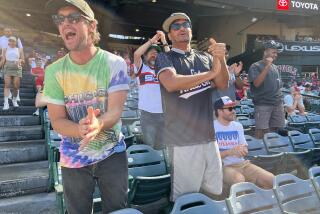Donnie Moore Dies in Apparent Suicide : Home Run Pitch in 1986 Playoffs Haunted Moore, Says His Agent
- Share via
Donnie Moore had been around professional baseball for more than a decade. He struck out almost 400 major league hitters and saved 85 games. But his career, and perhaps his life, was reduced to one batter, one pitch that would haunt him for the rest of his life.
Moore died Tuesday, after shooting his wife and then turning the gun on himself, according to police. He was 35.
For two seasons, Moore pitched relief for the Angels as no one had before him. In 1985, he saved 31 games, still a franchise record. He made the All-Star team that year. In 1986, he pitched through an assortment of injuries to save 21 games for the Angels, helping them win the American League West.
But with the Angels one strike away from the World Series in Game 5 of the American League playoffs, Moore, pitching with a throbbing right shoulder, hung a forkball that Boston’s Dave Henderson hit over the left-field wall.
A 5-4 Angel lead was erased--and, shortly thereafter, the Angels’ three-games-to-one edge in the series was gone as well.
“Ever since he gave up the home run to Dave Henderson he was never himself again,” said Dave Pinter, Moore’s agent of 12 years. “He blamed himself for the Angels not going to the World Series. He constantly talked about the Henderson home run.”
Pinter was so concerned that he suggested Moore seek professional help.
“It was that important to him that the Angels make it to the World Series,” Pinter said. “He couldn’t get over it. I tried to get him to go to a psychiatrist, but he said, ‘I don’t need it, I’ll get over it.’
“Even when he was told that one pitch doesn’t make a season, he couldn’t get over it. That home run killed him.”
Pinter was not alone in his assessment that Moore’s life changed after that pitch.
Brian Downing, who has played with the Angels since 1978, in an emotional outburst Tuesday night after the Angels’ game against Toronto blamed the media and fans for placing the albatross around Moore’s neck.
“Everything revolved around one . . . pitch,” Downing said. “You destroyed a man’s life over one pitch. The guy was just not the same after that.”
Downing said he could still see the headlines, hanging the loss on Moore. He said he could still hear the boos at Anaheim Stadium, which accompanied Moore to the mound until the club gave him his release last September.
“You buried the guy,” Downing said. “He was never treated fairly. He wasn’t given credit for all the good things he did.
“Nobody was sympathetic. It was always, ‘He’s jaking it, he’s fooling around.’ He was a very sensitive guy. I never, ever saw the guy credited for getting us to the playoffs, because all you ever heard about, all you ever read about was one . . . pitch.”
Doug DeCinces, the former Angel third baseman who is now out of baseball, echoed some of Downing’s thoughts.
“I think it is highly unfortunate that most fans will remember one pitch about Donnie,” DeCinces said. “I would have hoped Don would have forgotten that pitch.
“What most people don’t realize is that his arm was hurt in that situation, but because of his fierce competitiveness he took the ball knowing that he was hurt. Still he was going to give it everything he had.”
Bothered by chronic shoulder and rib-cage problems, Moore spent two lengthy stints on the disabled list in 1987. And when he was able to pitch, he seldom seemed the same, saving a total of five games.
As an Angel pennant drive collapsed in September of 1987, Mike Port, the team’s general manager, lashed out at Moore, implying that the club’s ace reliever was malingerer and telling him to “get out there and pitch.”
In the off-season, it was determined that Moore had been attempting to pitch with a painful bone spur in his lower back. The spur was surgically removed, but not the frustration. Moore’s 1988 season with the Angels was more of the same--more time on the disabled list, more boos, few saves.
Finally, he was released in early September. His Angel career was over--and so was his major league career. Moore attempted to catch on with Kansas City’s triple-A affiliate in Omaha this season, but after mediocre results (1-2, 6.39, no saves) he was released a month ago.
“That has to be a tough job, going from on top of the world one day to the bottom in a split-second,” Downing said. “Unfortunately, he never got back to the top of the box.”
Often buoyant during his first two seasons with the Angels, Moore turned gruff and defensive after the 1986 season. He had to be bigger than The Pitch, he had to be tougher than the boos.
But, according to Downing, it was all part of an act.
“He always said to me, ‘(The boos) don’t bother me,’ ” Downing said. “But he put up a big facade. He was a tough guy, but I can’t believe it didn’t bother him.”
Tonya Martin, Moore’s wife, said that in 1987 Moore would often come home after pitching at Anaheim Stadium and burst into tears.
“I know he was obviously frustrated,” Angel first baseman Wally Joyner said. “I’m sure it was hard on him. It was hard for me to watch that happen to Donnie. You don’t wish that on anybody, especially one of your teammates.”
Gene Mauch, the former Angel manager who made Moore the bullpen ace in 1985 and ‘86, said the pitcher filled a void when acquired as a free agent.
“He made our 1985 season,” Mauch said from his Palm Desert home. “He saved 31 games that year, that was something we needed desperately. He single-handedly made our season. If he had been in a little better shape at the end of the 1986 season that would have perhaps made his life different.
“If his arm had been a little better. The man had a lot of courage and a lot of heart. I’m just sorry he stopped living now.”
More to Read
Go beyond the scoreboard
Get the latest on L.A.'s teams in the daily Sports Report newsletter.
You may occasionally receive promotional content from the Los Angeles Times.






